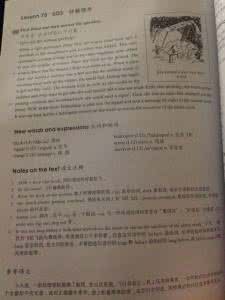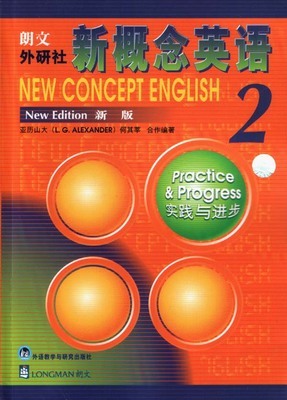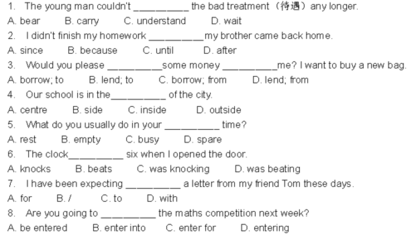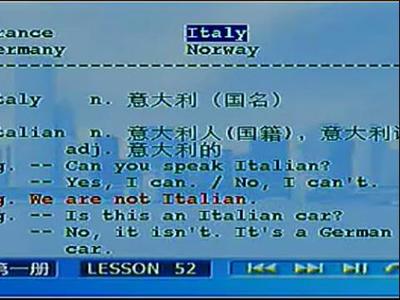Lesson 1 A private conversation 私人谈话 Where there is a will, there is a way. 有志者事竟成
get down to business 言归正传
1、private 【adj】. 私人的
1) 私人的 (personal)作定语修饰名词 eg.a private conversation 私人谈话
a prevate company 私人公司 a private life 私生活 a private school私立学校 a private secretary 私人秘书 private affairs 私事
如果妈妈想看你的信,你可以说It's my private letter.
如果陌生人想进你的房子,你可以说 It's my private house.
eg:That is for your private ear. 这是说给你一个人的秘密。 2) 秘密的 (secret)
a private place 一个秘密的地方 a secret place 一个秘密的地方 3) adj. 普通的
private citizen 普通公民 eg.I’m a private citizen. private soldier 大兵
《Private Ryan》(《拯救大兵瑞恩》)
2、conversation【n】 谈话
talk,say,speak,chat,discuss,gossip,dialogue conversation n. 非正式谈话
(an informal talk)
一般用于正式文体中,内容上往往不正式 have a conversation with sb. 与某人谈话 eg. I had a quiet conversation with my closest friend. 我和我最好的朋友进行密谈。 eg. I saw him in conversation with a friend. 我看见他在跟朋友谈话。
eg. No conversation while I'm talking. 我讲话的时候不要说话。 converse v.(不及物动词) converse with sb. 跟某人谈话
①talk n./v. 内容可正式可不正式, 也可以私人 talk with/to sb. 和谁谈话
talk with/to sb about sth. 跟某人谈论某事 ②say vt. 说 (说的内容,说的话)
say sth. 说了一些话
eg. He said nothing. 他什么也没说。 eg. "What a lovely day!" he said. 他说:“天气多好啊!”
③speak 【vt】. 讲(语言),说一门语言 speak a foreign language 讲一门外语 speak Chinese/ English 讲中文/英语
【vi】 说话,谈话,和谁谈话
speak to sb.和谁谈话
【n】speech 讲话,谈话
make a speech 做演讲
④chat n/v闲聊,就是北京人说的“侃”,说的是无关紧要的事(talk friendly)

eg:We had a long chat about old times. 我们聊了好多过去的事情。 ⑤discuss v.有严肃目的的讨论 discussion n. 讨论
⑥gossip v./n. refers to talk about private lives of other people (贬义) 说闲话,嚼舌头eg. He is nothing bu a gossip. (名词)他就是一个爱嚼舌头的人。
⑦dialogue 对话, 可以指正式国家与国家会谈 Eg.China and Korea are having a dialogue. 3、theatre n. (in US:theater) 剧院 metre — meter (in US) 米 centre — center (in US) 中心 go to the theatre 去看戏 go to the movies 去看电影 =go to the cinema=go the the film theatre = (口) play house theatre goer 戏迷= play goer
4、seat【n】座位
区别:seat n./vt. [si:t] sit vi. [sit]
chair椅子,指可以搬动的
eg. We don’t have enough chairs here. 我们没有足够的椅子。
seat 固定在某地的座位,指place
eg. Is this seat taken? 这儿有人坐了吗? 1)【n】 座位,座
eg. Have a seat, please. 请坐 =Take a seat, please.
eg. I had a very good seat.我的座位非常好
=Maybe I sat in the front of the theatre. 也许我坐在戏院的前面。 seatbelt = safety belt 安全带
in the driver’s seat =in the leader’s seat =in the leader’s place在领导的位置上,重要地位
back-seat driver 爱指手画脚的人 2) 【n】. 席位 win a seat 赢得席位 lose a seat 输掉席位 3) vt. 安排„„坐下 seat sb. 安排某人坐下 You seat him.你给他找个位置 seat yourself 安排你坐下 eg. Be seated, please. 请坐! 表请坐的方式: eg. Sit down, please.
Take your seat,please.(命令性) Will you have a seat?
Won’t you have a seat?(礼貌) Would you have a seat? Be seated, please.
Seat yourself, please.(更礼貌)
5、play【n】戏
1) n. 玩耍,游戏,娱乐
playboy 花花公子 playground 操场 2) v. 玩,玩耍(慎用) play with sb. 跟谁玩;玩弄某人
play with sth. 玩什么东西,摆弄什么东西 play with a ball 玩弄一个球 play with a toy 玩弄一个玩具 play gooseberry(醋栗):当电灯泡 3) 玩,比赛play football 踢足球 运动项目前不加“the” play the guitar 弹吉他 乐器前加“the” 4) n. 戏剧,剧本
theatre play 在戏剧上演的剧TV play 电视剧 soap play 肥皂剧play goer 戏迷
eg. It is as good as a play. 好玩极了。 eg. You must come here, or, there is no play. 你必须来这儿,否则就没戏了。
no play 没戏了 区别: play 戏剧,剧本
drama 戏,戏剧文学,戏剧艺术(更加严谨,正式) opera 歌剧Beijing opera 京剧
6、loud 【adj】. 大声的
loudly adv. 大声地 aloud adv. 大声地
eg. She called loudly for help. 她大声地求救。 =She called aloud for help. think aloud 自言自语 adj. + ly → adv.
angry adj. → angrily adv. rude adj. → rudely adv. eg. The young man said rudely. real adj. → really adv. exact adj. → exactly adv. quick adj. → quickly adv. quiet adj. → quietly adv. 7、attention 【n】. 注意 pay attention to sth. 对„„表示注意 pay some attention to sth. 给予一定的注意 pay more attention to sth. 给予更多的注意 pay close attention to sth. 给予密切的注意 pay great attention to sth. 给予极大的注意 pay enough attention to sth. 给予足够的注意 pay little attention to sth. 很少注意 pay no attention to sth. 根本不注意/毫不理会 turn a blind eye to sth. 视而不见 turn a deaf ear to sth. 充耳不闻 draw one’s attention 吸引„„注意力 =attract one’s attention
eg. The new type of computer draws our attention. 新款计算机吸引了我们的注意力。 eg. Attention, please. 请注意。
eg. Attention, passengers. The plane leaves at 9 o’clock. 乘客们请注意,飞机在9点钟起飞。 eg. Ladies and gentlemen, may I get your attention, please. 女士们先生们请注意!(非常客气)
eg. That’s all. Thank you for your attention. (演讲结束)感谢您听我讲这些。
=That’s all. Thank you for your time. pay attention: 从思想上注意、在意,如交通安
全应注意. notice: 眼睛上注意(=see 眼睛看) 7.★angry adj. 生气的 8.★angrily adv. 生气地
angry =cross I was angry. /He was cross. annoyed 恼火的 blue in the face脸上突然变色
程度加深脸色都青了, 相当生气了)
9、bear(bore, born) v. 容忍 1) n. 熊,粗鲁蛮横的人
eg. He’s really a bear. 他真是个粗鲁的家伙。 a bear market 熊市(股票下迭的行情) a blull market 牛市(股票上升的行情) a bear hug 紧紧地拥抱
eg. The old lady saw me and came and gave me a bear hug.那个老太太看见我过来给我一个大大拥抱give sb. a bear hug给某人一个大大的拥抱 成语bear’s service 帮倒忙/好心做错事 2) v. 忍受(stand, put up with sb.) (一般与can/could连用于疑问句及否定句中) endure:忍受,容忍 bear/stand/endure 忍受的极限在加大bear 忍受=stand=suffer 遭受,忍受 (精神或肉体上)痛苦,suffer后面必须加一种痛苦 I suffer the headache.(肉体上的痛苦) He often suffers defeat.(精神上的痛苦)(defeat 失败)
eg. I can’t bear the young man and the young woman behind me.
eg. I can’t bear it anymore. 我再也受不了了。 eg. I can’t bear the rude fellow. 我无法容忍这粗鲁的家伙=I can’t bear the bear. eg. I can’t bear to be laughed at. 我无法容忍被嘲笑。
bearable adj.可忍受的,经得住的
eg. The climate is bearable. 这个气候还是可以忍受的。
eg. The pain is bearable. 这疼痛是可以忍受的。 unbearable adj. 难以忍受的,不能忍受的 eg. I find his rudeness unbearable. 我发现他的粗鲁让人难以忍受。
unbearably adv. unbearably hot 热的无法忍受 unbearably selfish 自私得让人无法忍受 ②vt. 承受,支撑,承担,负担
Can the ice bear my weight?
Who will bear the cost? 谁来承担这笔费用? 9、business n. 1) 贸易,商业,买卖
(trade, commerce, buying and selling) a business man 商人a business woman 女商人 be on business 出差do business 做生意 business hours (商店的)营业时间 do good business 生意做得好
eg. How is your business? 生意怎么样? Half and half. 还行吧/一般
=Just so so. =It’s OK.=As usual. =Not to bad.=Great. 非常好.
=Couldn’t be better. 好的不能再好了。 2) 事情,事物(matter, affair)某人自己的私事 eg. Let’s get down to business. =Let’s get to business.
=Let’s come to business. 让我们言归正传。 eg. It’s none of your business. 不关你的事。 Mind your own business. 管好你自己的事就行了。 The Adventures of Tom Sawyer by Mark Twain: Tom sawyer: What’s your name?(不友好) The boy: It’s none of your business! Tom sawyer: I’ll make it my business. 我就让它成为我的事/我偏问不可。
The boy: You are a liar. 你这个大骗子。 Tom sawyer: You are another. 你是另一个 The boy: Get away from here. 从这儿给我滚开。 Tom sawyer: Get away yourself. 你才滚呢。 The boy: I won’t. 我不滚。
Tom sawyer: I won’t either. 我也不滚。 区别:thing/ business/ affair/ matter thing 任何的事情,事务
business 强调职责,责任(自己的私事) affair 强调发生过的或将要发生的事(具体) foreign affairs 外交事务 public affairs 公共事务
matter 被考虑,被处理的事(问题)
eg. What’s the matter with you? 你怎么了? 10、rudely adv. 粗鲁地rude adj. 粗鲁的 反义词:polite adj. 客气的,礼貌的 rudely adj. rudeness n. 粗鲁
Lesson 2 Breakfast or lunch? 早餐还是午餐? 1.until prep. 在„以前;到„为止
1) prep. 直到„„时候 till 直到(多用于口语) eg. I sometimes stay in bed until lunchtime. 我有时到吃午饭前一直躺在床上。
eg. The street is full of cars from morning till/to night 这条街上从早到晚地挤满了车辆。 2) conj. 直到„„时候(后接句子) wake sb up 唤醒某人
①eg. I stayed(延续性动词) in bed until he woke me up.直到他叫醒我我一直躺在床上。 ②eg. I didn’t get upuntil he woke me up. 直到他叫醒我我一直躺在床上。 until 主句中动词为延续性动词
not „ until 主句中动词为非延续性动词 until用于表示动作、状态等的持续,可译为“一直到„„为止”或“在„„以前”。在肯定句中,它与表示持续性状态的动词连用,表示持续到某一时刻:eg. I will wait for you until you come back. (wait 是延续性动词)我会一直等到你回来。 = I won’t leave until you come back.在你回来前我不会离开
在否定句中,它通常与描述短暂动作的动词连用,表示“到„„为止”、“直到„„才”:
until(后的从句)的时间终止之前,这个动作做了还是没做?做了前面的主句用肯定;没做前面的主句用否定eg.We stayed until the rain stopped. 我们一直呆到雨停了。
= We didn’t start until the rain stopped. 我们等到雨停了才开始—雨停之前我们并未开始 2.outside 【adv】. 外面 1)n. 外面
eg. the outside of the house.房子的外面 2) adj. 户外的
eg. an outside toilet.户外的厕所 eg. ouside help 外来的帮助 3) adv. 外面
eg. It was dark outside. 外面很黑。 eg. Please wait outside. 请在外面等。 eg. Don’t go outside because it’s too cold. 不要出去,因为外面很冷。 4)prep. 在„„之外
eg. It’s outside my business. 这不关我的事.反义词:inside n./adj./adv./prep 里面
3.ring( rang – rung) (铃,电话等)响 1) n. 环状物,(尤指)戒指
a wedding ring 结婚戒指a gold ring 金戒指 a diamond ring 钻石戒指
dark rings around her eyes 黑眼圈 ring-road 环状公路 大姆指:thumb (b不发音)
食指:index finger; the first finger; pointer 中指:middle finger; the second finger 无名指:ring finger; the third finger 小拇指:little finger; pinkie have a ring on the middle finger订婚 have a ring on the third finger已婚 2) v. (铃,电话等)响
(这种响是刺耳的, 往往是提醒人做某事) eg. The door bell rang just now 刚刚门铃响了。 eg. I rang the bell. 我按响了门铃。 3) v. (u.s.:call ) 打电话
ring sb (up) 给„„打电话=call sb (up) phone sb.=telephone sb. give sb. a phone call eg. I’ll ring you later. 我会迟些给你打电话. ring off: put down the receiver; hang off eg. He rang off before I could explain. 我还没有解释他就挂断电话了。 4.aunt n. 姑,姨,婶,舅母
(所有长一辈的女性都用这个称呼)
uncle n. 叔叔,舅舅,姨夫,姑父 brother 哥,弟sister 姐,妹
nephew 侄子,外甥niece 侄女,外甥女 cousin 堂(表)兄弟姐妹
eg. a country cousin (贬)乡下人,乡巴佬
5.repeat v重复.
① vt. 重复Will you repeat the last word? ② vi. 重做,重说Please repeat after me. (say or write again, more than once) 重复说或写某事物,反复重申
eg. I repeated the question several times. 这个问题我重复好几遍了。
eg. Am I repeating myself? 我以前说过这件事吗?
repetition n. 重复、反复,重说,重写 learn by repetition 通过反复学习
百度搜索“爱华网”,专业资料,生活学习,尽在爱华网
 爱华网
爱华网



